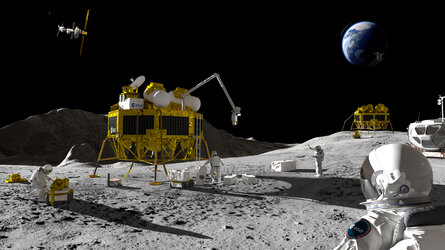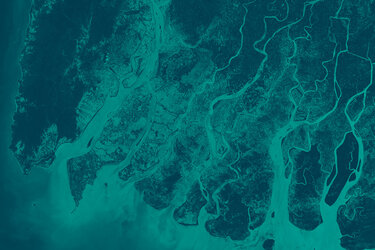Winners presented with ESA-EGU Excellence award
The winners of the first ESA-EGU Excellence Award were awarded their prizes earlier today at the virtual EGU General Assembly ceremony, attended by ESA’s Director General, Josef Aschbacher and ESA’s Acting Director of Earth Observation Programmes, Toni Tolker-Nielsen.
In late 2020, ESA and the European Geosciences Union (EGU), opened a competition for two awards in Earth observation excellence. The awards are aimed towards researchers in the early phases of their career who have made an outstanding contribution to the innovative use of Earth observation data primarily from European satellites. Two types of awards were advertised: a team and an individual award.
Following the nomination and selection process, a panel of high-standing Earth observation scientists reviewed the 40 nominations and judged the nominees according to the following categories: excellence in science, excellence in innovation, impact in the field of Earth observation and potential for future Earth observation contributions.

ESA and EGU are delighted to announce Benoit Meyssignac, a scientist working in the field of oceans remote sensing and geodesy, as the winner of the individual award. Benoit Meyssignac is an internationally renowned expert in the development and analysis of satellite altimetry and space gravimetry observations to tackle fundamental climate science questions.
Benoit has co-authored more than 60 publications in peer-reviewed journals with more than 3700 citations. He participated in the recent Intergovernmental Panel on Climate Change (IPCC) report as lead author of the sea level chapter of the Special Report on the Ocean and Cryosphere in a Changing Climate (SROCC), contributing author of the polar chapter of the SROCC report and reviewer of the Sixth Assessment Report (AR6).
Benoit Meyssignac commented, “During the past ten years, my team and I have been able to show that space geodetic measurements from satellite altimetry and satellite gravimetry allows quantification with unprecedented precision of the ocean components of the climate water-energy cycle. This work paves the way for the use of sea level and geoidetic remote sensing to provide a new constraint on the Earth's radiation budget and climate sensitivity. This award is timely to highlight these promising results. I am very happy to receive it and I will share it with my team.”
The Hydrology Team of the National Research Council – Research Institute for Geo-Hydrological Protection has won the team award. The team, made up of Angelica Tarpanelli, Christian Massari, Luca Brocca, Luca Ciabatta and Stefania Camici, has a profound expertise in hydrological and hydraulic modelling by using satellite and ground-based sensors.

Starting from the pioneering studies on the assimilation of satellite soil moisture products into hydrological modelling, the team has also developed innovative methods to estimate rainfall and irrigation from soil moisture data. The team’s work in recent years has demonstrated the potential of satellite products as a crucial support to the hydrological community in improving flood forecasting systems, drought and landslide prediction, and estimating river flow in natural channels.
Angelica Tarpanelli, researcher at the Italian National Research Council, commented, “Vast regions of the world lack the data needed to predict water supply. With our work, we are unlocking the unprecedented potential of Earth observation to solve this problem. Earth observation can solve the outstanding challenge of hydrologic prediction in data scarce regions, and our research is addressing the target."
ESA’s Acting Director of Earth Observation Programmes, Toni Tolker-Nielsen, said, “Today’s awardees are young and are at the beginning of their career. The awards will give them the opportunity to make their work more visible to the community, allowing to push new technologies and innovations in Earth observation in a wider context.
“We would like to congratulate you on this extraordinary recognition. We are sure that you will continue to pioneer European Earth observation scientific achievements in the future and that we will hear from you again!”
The winners were awarded with free entry to the next in-person EGU General Assembly, as well as travel and expenses, set to take place in 2022.















 Germany
Germany
 Austria
Austria
 Belgium
Belgium
 Denmark
Denmark
 Spain
Spain
 Estonia
Estonia
 Finland
Finland
 France
France
 Greece
Greece
 Hungary
Hungary
 Ireland
Ireland
 Italy
Italy
 Luxembourg
Luxembourg
 Norway
Norway
 The Netherlands
The Netherlands
 Poland
Poland
 Portugal
Portugal
 Czechia
Czechia
 Romania
Romania
 United Kingdom
United Kingdom
 Slovenia
Slovenia
 Sweden
Sweden
 Switzerland
Switzerland































